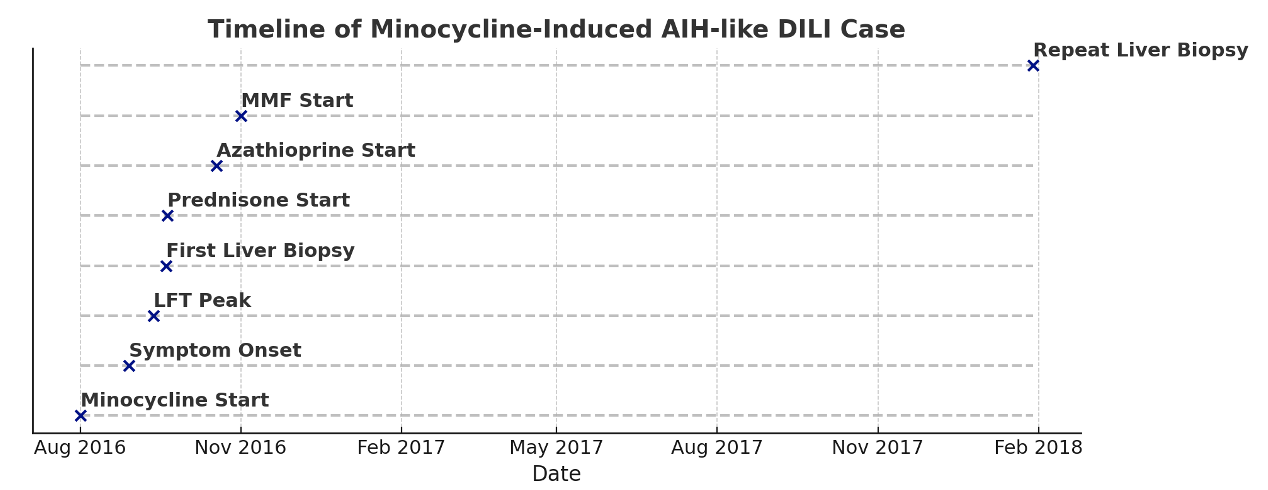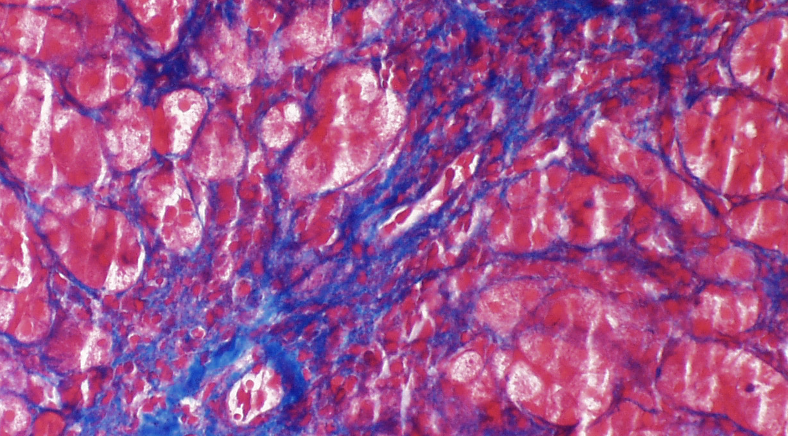Tuesday Poster Session
Category: Liver
P6060 - Minocycline-Induced Autoimmune-Like Hepatitis With Rapid-Onset Bridging Fibrosis: First Report of Drug-Triggered Dynamic Fibrosis
Tuesday, October 28, 2025
10:30 AM - 4:00 PM PDT
Location: Exhibit Hall
.jpg)
Isaac Giovannie, MD
Rush University Medical Center
Chicago, IL
Presenting Author(s)
Giovannie Isaac-Coss, MD1, Aryanna Sousa, MD, MPH2, Meghana Kakarla, MD3, Justin Mitchell, MD1, Maham Lodhi, MD1, Nancy Reau, MD, FACG1
1Rush University Medical Center, Chicago, IL; 2Rush University Medical Center, Providence, RI; 3Infirmary Health, Mobile, AL
Introduction: Minocycline is a commonly prescribed antibiotic for dermatologic conditions and is known to cause rare autoimmune hepatitis-like drug-induced liver injury (DILI). While transient transaminase elevations have been reported, progression to advanced fibrosis and persistent histologic inflammation despite biochemical normalization has not previously been described.
Case Description/
Methods: A 57-year-old obese male (BMI 26) with no prior autoimmune disease, metabolic syndrome, or alcohol use presented with scleral icterus and elevated liver enzymes after 6–8 weeks of minocycline (100 mg daily) for presumed acneiform lesions. Labs showed AST 1,342 U/L, ALT 1,285 U/L, total bilirubin 7.4 mg/dL, albumin 2.6 g/dL, and ALP 299 U/L. Viral hepatitis and CMV/EBV PCRs were negative. Autoimmune workup revealed ANA 1:640 and elevated IgG (2,906 mg/dL); dsDNA was mildly elevated, with negative anti-Smith, SMA, and anti-RNP.
CT showed hepatic steatosis without cirrhosis. Liver biopsy was performed to confirm diagnosis and assess reversibility, revealing severe interface hepatitis with plasma cells, rosettes, and bridging fibrosis (stage 3), consistent with autoimmune-like DILI (Images 2). Minocycline was discontinued, and the patient responded to prednisone; azathioprine was later switched to mycophenolate mofetil (MMF) due to rash.
Despite normalization of liver enzymes, a repeat biopsy 18 months later (to evaluate potential immunosuppression withdrawal) showed persistent grade 2 inflammation and stage 3 fibrosis. HVPG remained < 5 mmHg, confirming no portal hypertension. MMF was continued, and the patient remains clinically stable (Image 1).
Discussion: This is the first reported case of minocycline-induced autoimmune-like DILI leading to advanced fibrosis within weeks of exposure. While severe necrosis can accelerate fibrogenesis, this case was notable for severe fibrosis at initial presentation, suggesting exceptionally rapid-onset dynamic fibrosis. Despite biochemical remission, persistent histologic activity reinforces the disconnect between labs and tissue resolution. Although the clinical course supports drug-induced injury, the possibility of de novo autoimmune hepatitis triggered or unmasked by minocycline cannot be excluded. This case underscores the aggressive fibrogenic potential of immune-mediated liver injury and the critical role of biopsy in guiding long-term immunosuppression decisions.

Figure: Image 1: Clinical Timeline of Minocycline-Induced Autoimmune-Like Hepatitis with Bridging Fibrosis.
This timeline illustrates the sequence of events in a patient who developed autoimmune-like hepatitis with advanced fibrosis following 6–8 weeks of minocycline therapy. Key clinical milestones include symptom onset, peak liver enzyme levels, liver biopsies, and initiation of immunosuppressive therapies (prednisone, azathioprine, and mycophenolate mofetil). Notably, repeat liver biopsy 18 months later showed persistent histologic inflammation despite normalized liver enzymes, guiding continued immunosuppression

Figure: Image 2: Trichrome stain showing portal-to-portal fibrous bridging consistent with stage 3 of 4 fibrosis (x 200 magnification).
Disclosures:
Giovannie Isaac-Coss indicated no relevant financial relationships.
Aryanna Sousa indicated no relevant financial relationships.
Meghana Kakarla indicated no relevant financial relationships.
Justin Mitchell indicated no relevant financial relationships.
Maham Lodhi indicated no relevant financial relationships.
Nancy Reau: AbbVie – Grant/Research Support. Arbutus – Advisor or Review Panel Member. Gilead – Advisory Committee/Board Member, Grant/Research Support. Salix – Advisory Committee/Board Member, Grant/Research Support. VIR – Advisory Committee/Board Member, Grant/Research Support.
Giovannie Isaac-Coss, MD1, Aryanna Sousa, MD, MPH2, Meghana Kakarla, MD3, Justin Mitchell, MD1, Maham Lodhi, MD1, Nancy Reau, MD, FACG1. P6060 - Minocycline-Induced Autoimmune-Like Hepatitis With Rapid-Onset Bridging Fibrosis: First Report of Drug-Triggered Dynamic Fibrosis, ACG 2025 Annual Scientific Meeting Abstracts. Phoenix, AZ: American College of Gastroenterology.
1Rush University Medical Center, Chicago, IL; 2Rush University Medical Center, Providence, RI; 3Infirmary Health, Mobile, AL
Introduction: Minocycline is a commonly prescribed antibiotic for dermatologic conditions and is known to cause rare autoimmune hepatitis-like drug-induced liver injury (DILI). While transient transaminase elevations have been reported, progression to advanced fibrosis and persistent histologic inflammation despite biochemical normalization has not previously been described.
Case Description/
Methods: A 57-year-old obese male (BMI 26) with no prior autoimmune disease, metabolic syndrome, or alcohol use presented with scleral icterus and elevated liver enzymes after 6–8 weeks of minocycline (100 mg daily) for presumed acneiform lesions. Labs showed AST 1,342 U/L, ALT 1,285 U/L, total bilirubin 7.4 mg/dL, albumin 2.6 g/dL, and ALP 299 U/L. Viral hepatitis and CMV/EBV PCRs were negative. Autoimmune workup revealed ANA 1:640 and elevated IgG (2,906 mg/dL); dsDNA was mildly elevated, with negative anti-Smith, SMA, and anti-RNP.
CT showed hepatic steatosis without cirrhosis. Liver biopsy was performed to confirm diagnosis and assess reversibility, revealing severe interface hepatitis with plasma cells, rosettes, and bridging fibrosis (stage 3), consistent with autoimmune-like DILI (Images 2). Minocycline was discontinued, and the patient responded to prednisone; azathioprine was later switched to mycophenolate mofetil (MMF) due to rash.
Despite normalization of liver enzymes, a repeat biopsy 18 months later (to evaluate potential immunosuppression withdrawal) showed persistent grade 2 inflammation and stage 3 fibrosis. HVPG remained < 5 mmHg, confirming no portal hypertension. MMF was continued, and the patient remains clinically stable (Image 1).
Discussion: This is the first reported case of minocycline-induced autoimmune-like DILI leading to advanced fibrosis within weeks of exposure. While severe necrosis can accelerate fibrogenesis, this case was notable for severe fibrosis at initial presentation, suggesting exceptionally rapid-onset dynamic fibrosis. Despite biochemical remission, persistent histologic activity reinforces the disconnect between labs and tissue resolution. Although the clinical course supports drug-induced injury, the possibility of de novo autoimmune hepatitis triggered or unmasked by minocycline cannot be excluded. This case underscores the aggressive fibrogenic potential of immune-mediated liver injury and the critical role of biopsy in guiding long-term immunosuppression decisions.

Figure: Image 1: Clinical Timeline of Minocycline-Induced Autoimmune-Like Hepatitis with Bridging Fibrosis.
This timeline illustrates the sequence of events in a patient who developed autoimmune-like hepatitis with advanced fibrosis following 6–8 weeks of minocycline therapy. Key clinical milestones include symptom onset, peak liver enzyme levels, liver biopsies, and initiation of immunosuppressive therapies (prednisone, azathioprine, and mycophenolate mofetil). Notably, repeat liver biopsy 18 months later showed persistent histologic inflammation despite normalized liver enzymes, guiding continued immunosuppression

Figure: Image 2: Trichrome stain showing portal-to-portal fibrous bridging consistent with stage 3 of 4 fibrosis (x 200 magnification).
Disclosures:
Giovannie Isaac-Coss indicated no relevant financial relationships.
Aryanna Sousa indicated no relevant financial relationships.
Meghana Kakarla indicated no relevant financial relationships.
Justin Mitchell indicated no relevant financial relationships.
Maham Lodhi indicated no relevant financial relationships.
Nancy Reau: AbbVie – Grant/Research Support. Arbutus – Advisor or Review Panel Member. Gilead – Advisory Committee/Board Member, Grant/Research Support. Salix – Advisory Committee/Board Member, Grant/Research Support. VIR – Advisory Committee/Board Member, Grant/Research Support.
Giovannie Isaac-Coss, MD1, Aryanna Sousa, MD, MPH2, Meghana Kakarla, MD3, Justin Mitchell, MD1, Maham Lodhi, MD1, Nancy Reau, MD, FACG1. P6060 - Minocycline-Induced Autoimmune-Like Hepatitis With Rapid-Onset Bridging Fibrosis: First Report of Drug-Triggered Dynamic Fibrosis, ACG 2025 Annual Scientific Meeting Abstracts. Phoenix, AZ: American College of Gastroenterology.
